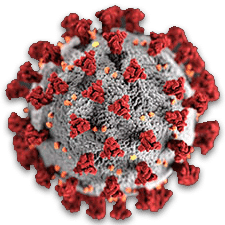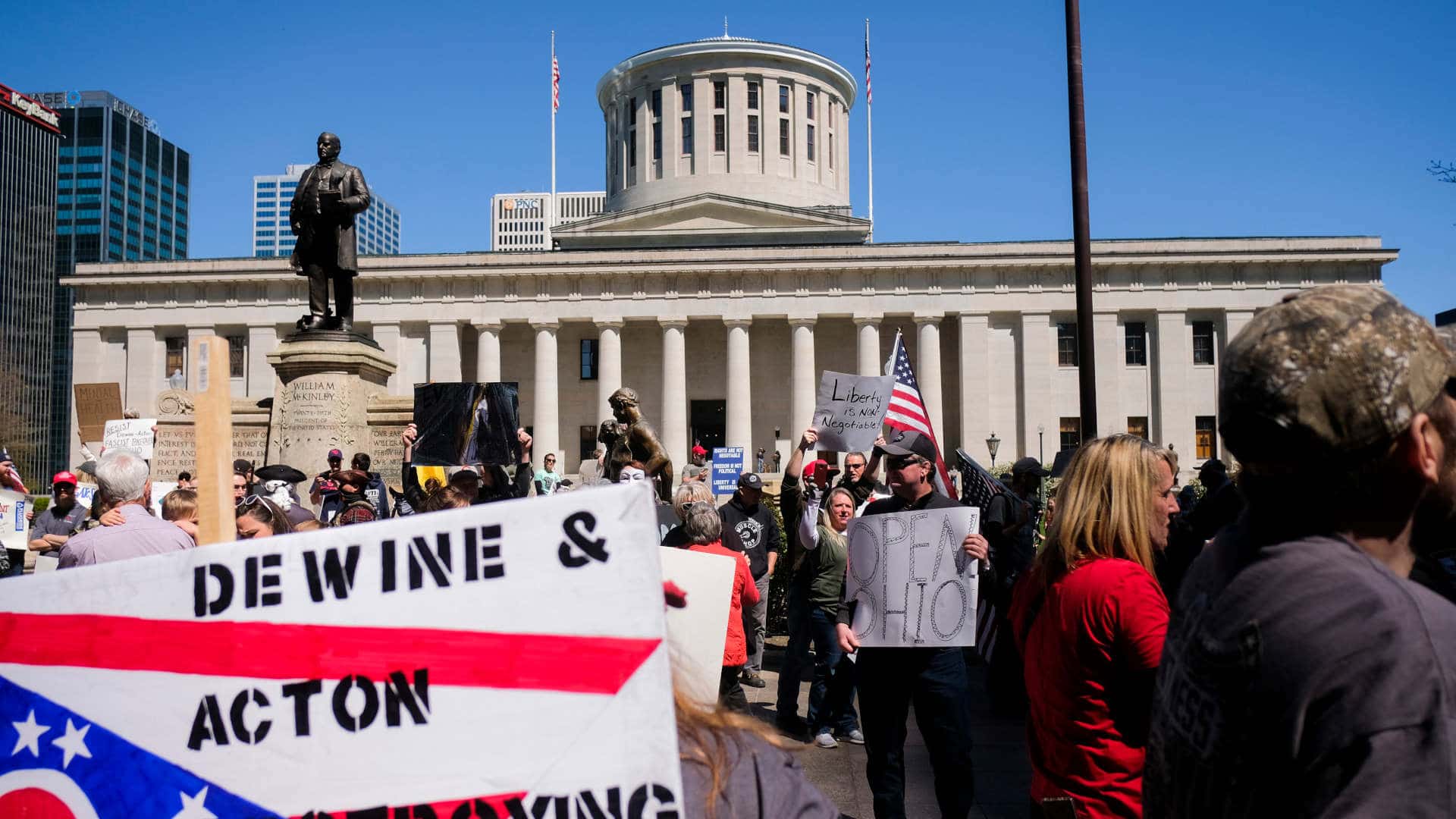A Year Into Covid, States Debate Public Health Shutdown Powers
In a debate on the floor of the Tennessee state House early last month, a power struggle was underway. A Republican-sponsored bill aims to strip the state’s six metropolitan health boards of their authority to limit public activity and make other rules during times of disease outbreaks. “If we don’t pass this legislation, these health boards would have more power in that county than the governor does, and that’s not the way our system of government works,” declared the bill’s chief sponsor, Jason Zachary of Knoxville.
An incredulous Bill Beck, a Nashville Democrat, was unmoved: “For us to sit here and say that we would want to follow the politicians instead of following the science I think is the wrong message to be putting out, especially during a pandemic,” Beck said. “We need to know that we can follow the experts, and not somebody who’s worried about getting re-elected.”
Tennessee is far from alone. Since early in the Covid-19 pandemic, some lawmakers have argued that public health measures intended to combat the virus — such as mask mandates and business closures — were overwrought and misguided infringements on personal liberties. Now, as state legislatures convene across the United States for their 2021 sessions, a Republican-led legislative backlash is seeking to relocate, reduce, or otherwise refine the power to make these and other public health decisions.
 |
For all of Undark’s coverage of the global Covid-19 pandemic, please visit our extensive coronavirus archive. |
In Florida, for example, a proposed bill would prevent local governments from issuing emergency orders for more than six weeks. Legislators in Ohio, meanwhile, recently passed a bill that would limit the governor’s own power to issue public health orders, while also weakening the authority of local boards of health. And numerous other measures — in Kansas, Michigan, Missouri, Montana, Oklahoma, West Virginia, and other states — aim to challenge or curtail the authority that governors, mayors, and public health officials have wielded during the current pandemic.
Many of these proposals, supporters say, are grappling with gaps in state law that came to light amid the Covid-19 crisis, including the ability of some officials to issue open-ended edicts, or wield other unchecked public powers. And even among public health law experts, there’s widespread agreement that some reforms are warranted. “An event of this magnitude is always going to have repercussions and ramifications in the law,” said Jill Krueger, an attorney at The Network for Public Health Law, a nonprofit that offers legal support to public health officials across the country.
But Krueger and other experts say they also worry that misinformation, partisanship, and the rancorous politics of Covid-19 have warped the new legislative push. The result, they argue, could quietly reshape the landscape of public health authority in the United States — and hamper the role of scientific expertise in combatting future crises.
“We see this as a serious threat to public health,” Krueger said.
Under U.S. law, states have extensive powers to respond to threats to public safety. That’s why, during a crisis like Covid-19, governments can institute mask mandates, shutter businesses, limit gatherings, and require people to quarantine.
Each state has its own way of distributing and limiting those powers, and arrangements vary widely. Typically, some authority in a pandemic-scale crisis rests with the governor, who can invoke emergency powers, guided by the advice of state health experts. In many states, some power also sits with local boards of health — appointed bodies generally composed of a mix of medical experts and community leaders.
In principle, these powers allow officials to respond quickly to threats, guided by expert input. But, civil libertarians warn, public health authority sometimes infringes on individual rights. And it can be subject to abuse.
When Covid-19 lockdowns began in March 2020, governors and local officials issued public health orders intended to combat the spread of the virus. Many invoked emergency powers designed to last for a few days or weeks — not for a months-long pandemic. Issues like mask-wearing soon became polarizing, and while prominent Democrats called for stringent public health measures, many Republicans, including then-President Donald Trump, questioned the science and law underpinning certain policies.
Public health has, to some extent, become “yet another of America’s endless political battlegrounds,” said Wendy Parmet, who directs the Center for Health Policy and Law at Northeastern University School of Law. “We fight, politically, everything from Dr. Seuss to Covid,” she said. “What has happened is that in many states, as a result of this, legislatures are rushing to consider and enact measures to reduce the governor’s authority.”
Most state legislatures in the U.S. do their lawmaking between January and May. As the 2021 legislative sessions began, momentum grew for longer-term changes. In January, the conservative American Legislative Exchange Council, or ALEC, weighed in. An influential advocacy organization, ALEC writes model legislation that right-leaning lawmakers can then adapt to their specific states. The organization’s proposed Emergency Power Limitation Act, for example, appears designed to limit the scope of business closures and similar orders from governors and local officials. This includes ensuring that after a certain amount of time — ALEC suggests 30 days at most — such public health policies automatically expire, unless state legislatures approve them.
Under this concept, a public health order closing restaurants, for example, might expire in 30 days unless it received majority support from a state House and a state Senate.
Although it’s unclear if ALEC influenced any specific state-level bills, legislation reflecting many of these principles has appeared in many states. In places like Ohio and Pennsylvania, where Republican-controlled legislatures have clashed with more moderate governors, the bills often aimed to take power from governors and give it to legislatures. In states like Florida and Tennessee, where more progressive cities have conflicted with Republican state leaders, the bills often aim to strip power from local communities, or shift it from boards of health to elected officials.
The idea that elected assemblies should have such direct power over public health decisions has alarmed some advocates, who say it could hamper emergency responses and further politicize public health. “If elected officials are making these decisions outside of the advice or the recommendations or the guidance of public health, they’re just going to be seen as political,” said Lori Tremmel Freeman, the chief executive officer of the National Association of County and City Health Officials, or NACCHO.
“It’s a really dangerous game that we play when we pick a crisis and we make lasting changes based on that crisis alone,” Freeman said. She worries that legislation passed during Covid-19 will limit health officials’ ability “to act quickly and nimbly” in future crises.
Such concerns have not stopped lawmakers from pressing forward with legislation, and supporters of those bills have sometimes argued that they say are necessary to prevent public health measures from infringing on individual liberties.
In February, Florida state representative Bob Rommel introduced a bill that, in its current form, would prevent local governments from implementing emergency orders for more than 42 days. Under the bill, a municipality that wishes to close bars during a pandemic, for example, would have to renew the policy weekly — and then lose the power to implement it altogether after six weeks. (Other bills aiming to curtail local governments’ emergency powers are currently moving through the Florida state Senate and House.)
In an interview, Rommel questioned the public health value of restrictive public health policies — and said that, as the owner of a restaurant in New Jersey, he has experienced firsthand the impact of pandemic-era public health policies. And the complaints he’s heard from his constituents, the Naples Republican said, are mostly about “the draconian measures of local governments taking away their right to earn a living, or go to church, or any other liberty that they thought was best for themselves.”
Asked whether taking powers away from cities was itself an example of government overreach, Rommel demurred. It was important, he said, to have consistent policies across the state, rather than a patchwork of local regulations.
In Tennessee, meanwhile, tempers have simmered for months over public health orders, including a long-running dispute in Knox County, which encompasses the city of Knoxville. There, the elected county mayor — a longtime professional wrestler — has frequently clashed with the appointed members of the Knox County Board of Health.
In November, Zachary, the Knoxville Republican, first proposed his bill stripping rulemaking power from the boards of health in Knox County and the five other large metropolitan areas in Tennessee, including Nashville and Memphis. Instead, the power would shift to local elected leaders, like county mayors. During last month’s hearings, Zachary criticized a system that allows unelected boards to wield power for months on end, describing the boards as oligarchies. His bill, he argued, would just add some democratic oversight.
The proposal has elicited skepticism from Democratic lawmakers. During another hearing, Nashville Democrat John Ray Clemmons pointed out that boards of health are appointed by the county commissions. “The county commission’s elected,” he said, “and held accountable to the voters.”
In an emailed statement to Undark, Knox County Health Department director Martha Buchanan wrote that it was too soon to speculate on the precise implications of the final legislation, which passed the House on March 8. But, Buchanan added: “We have concerns over politics influencing public health decisions.”
Soon after, the local officials bypassed the state: At the end of March, the Knox County Commission voted to strip powers from the Board of Health. A version of Zachary’s bill, meanwhile, is still awaiting a vote in the state Senate.
In interviews, several public health experts said they shared some of the broader concerns about democratic oversight that Zachary and other Republican lawmakers have raised. “I think the pandemic has certainly exposed gaps in our laws,” said Parmet. “Important gaps.” In many states, she said, governors and public health officials have invoked emergency powers designed for a short-term incident, like a tornado, and then stretched them to last for months.
Krueger, the Network for Public Health Law attorney, appeared to agree. “I think those concerns are legitimate, and deserve a fair hearing,” she said “They deserve to be aired and grappled with, and resolved. But resolved in a thoughtful, deliberative way.”
Some public health law experts are beginning to sketch out what those resolutions might look like, and last year the Uniform Law Commission, an influential nonpartisan organization that drafts model legislation for states, assembled a committee (which includes Parmet) to explore public health emergency laws.
For now, the worry, Krueger and other analysts suggest, is that the legislative push in many states is neither thoughtful nor deliberate, which could have potentially serious consequences the next time a major public health threat emerges — something scientists suggest is all but certain. “My concern is that, if state legislatures essentially handcuff public health, that the people living in those states, the health of the people living in those states, may suffer,” Kreuger said.
“Decisions might be made more on public sentiment, or even misinformation,” she added — and not “based on the facts.”











